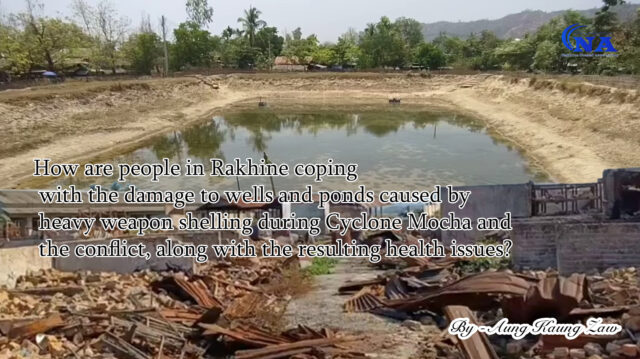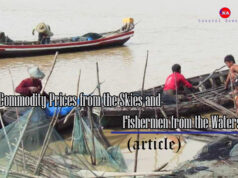After Cyclone Mocha, as clashes resumed in the Rakhine region, civilians who were forced to flee their homes due to the conflict began to rely more on unsafe water sources. This led to a surge in health issues, and eventually, even deaths were reported hardships that the people of Rakhine have had to endure.
On May 14, 2023, Cyclone Mocha struck Rakhine with devastating force. As a result, in 12 townships across the state, hundreds of drinking water ponds—along with residential homes—were damaged or destroyed due to saltwater intrusion and flooding.
Before restoration and cleaning could be carried out on the damaged homes and drinking water ponds, renewed clashes between the military junta and the Arakan Army (AA) broke out again on November 13, 2023. As a result, hundreds of thousands of local residents were once again forced to flee their homes and seek shelter in displacement camps.
During these renewed clashes, the fighting between the military junta and the Arakan Army (AA) intensified significantly. The junta launched attacks using naval forces, airstrikes, and heavy artillery, which caused further destruction of civilian homes, religious sites, and essential drinking water ponds.
Due to the shelling with heavy artillery, debris from buildings and fallen trees have ended up in the ponds, causing the drinking water sources to become contaminated and unhygienic.
Moreover, since Cyclone Mocha, most of the drinking water ponds have not been cleaned. As a result, people have been forced to use stagnant and unclean water as their primary drinking source, according to a displaced person from Pauktaw Township, where the conflict has been particularly intense.
“Even now, we are still using stagnant and murky water,” she explained. “During the summer, the ponds dried up, and when it finally rained, we had no choice but to use that rainwater. That’s what we are still using now,” she explained.
Throughout the recent summer and into the current rainy season, displaced civilians have had to rely on unsafe and contaminated water sources. As a result, many have suffered from diarrhea and other waterborne illnesses. Due to the lack of adequate medical treatment in displacement camps, some cases have even led to death, according to another displaced woman currently residing in Pauktaw Township.
“There have been deaths due to people not receiving timely medical treatment,” she said. “They drank contaminated water and couldn’t access proper medicine in time — that’s why some people died.”
Additionally, during clashes between the military junta and the Arakan Army (AA), artillery shells reportedly landed in drinking water ponds and wells. Some of these shells remain unexploded, and debris from the conflict has contaminated the water, making many ponds unusable. According to civil society organizations in northern Rakhine, numerous water sources remain abandoned due to these risks.
A woman from a local civil society group explained, “When artillery shells or drone-fired weapons fall into the ponds, people become too scared to use the water.”
With each passing year, the people of Rakhine are facing rising temperatures and increasingly erratic weather patterns. Unpredictable rainfall and the lack of a proper water storage system have led to worsening water shortages across the region. These challenges have only been compounded by the twin crises of Cyclone Mocha and ongoing armed conflict — hardships that have struck the population back-to-back, like being bitten by a snake and then stung by a scorpion.
During the peak of the dry season, especially around the Burmese New Year (Thingyan), residents are often left with nothing but murky, discolored water to rely on. With most ponds dried up, communities gather around the few remaining water sources. Near these last standing ponds, people of all ages — from elderly individuals to young children, women and men alike — queue up with their water pots, waiting patiently for their turn to collect a few precious liters.
The pond water is too shallow to dip even a small container into. Instead, people use small bowls, about the size of a soup dish, to scoop up the water bit by bit. Once enough has been collected, they pour it into their larger metal water pots and carry it home — a slow and strenuous process that has become a routine part of survival in water-scarce Rakhine.
As summer intensifies across Rakhine, many drinking water ponds begin to dry up, leaving villages with dwindling supplies. In response, local elders have stepped in to ration what little remains, regulating water usage and ensuring that each household receives only a limited amount.
Scenes like these are now common in many villages throughout northern Rakhine, including areas like Pauktaw Township — a region traditionally known for its high rainfall. Ironically, despite being part of Myanmar’s wet zone, these villages are witnessing an annual struggle for water during the dry season.
Last summer, water scarcity was especially severe in townships such as Pauktaw, Kyauk Taw, Minbya, Ponnagyun, Rathedaung, and Buthidaung. These areas, already home to displaced communities, were further impacted by the destruction caused by Cyclone Mocha, which damaged critical water storage infrastructure, leaving many residents with little to no access to safe drinking water.
During times of water scarcity, some villages and displacement camps in Kyauktaw Township — those located near freshwater sources like the Kaladan River — can use river water by pumping it in. However, for those camps situated farther away from such water sources, accessing clean water remains a serious challenge.
Even among the displaced communities who rely on river water, many continue to suffer from seasonal outbreaks of illnesses such as diarrhea and skin infections, according to a local resident from Kyauktaw Township.
“In the summer, we have no choice but to use water from the streams. When we bathe in it, it causes skin irritation and rashes. And it’s hard to get proper treatment because health clinics often lack the necessary medicines,” one displaced resident said.
Due to the presence of unexploded artillery and the use of contaminated water, displaced communities are in dire need of a systematic approach for water usage. Not only is it essential to properly dispose of waste in designated areas, but health experts stress the need to pay close attention to sanitation during the rainy season, as it increases the risk of waterborne diseases such as diarrhea and skin infections.
“Affected individuals who use unclean water are at high risk of developing skin diseases (rashes), diarrhea, cholera (severe diarrhea), blood poisoning, intestinal parasites, and even polio-related joint diseases. For children, these illnesses can be fatal. Diarrheal diseases spread quickly, and deaths are common. If a child has diarrhea five times, they become very weak. Without access to health clinics for timely treatment, they are likely to die. It’s crucial to dispose of waste properly and live in ways that prevent the spread of these diseases,” said a former nurse, advising the displaced people using contaminated water.
Since the conflict resumed in Rakhine, the military junta has not only denied access to government hospitals and restricted the import of medicines to pharmacies, but they have also blocked the transportation of medical supplies. Additionally, they have cut off internet lines to prevent the public from accessing important health information.
The impact of the ongoing conflict and the damage caused by storms has left many water reservoirs in Rakhine’s northern region destroyed. Local authorities are unable to distribute water properly. As a result, displaced persons and local communities are expected to continue to suffer from severe water shortages during this year’s dry season, according to local civil society groups in the region.
“The main issue with the water shortage is related to the management and control of the water resources. In Rakhine, during the rainy season, people did not maintain the water reservoirs carefully. They left them unattended. As a result, when the dry season and the cold season arrived, it became impossible to properly conserve the water. If this continues this year, water will become even more scarce, especially in areas like Ponnakyun Township,” said a local civil society leader from the area.
Currently, the Arakan Army (AA) has full control over most of northern Rakhine. Local residents are hoping that the water management systems will be maintained properly during the upcoming dry season to avoid further water shortages, which could further affect the people of the region.
By Aung Kaung Zaw





